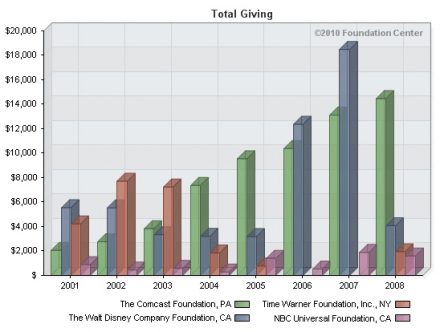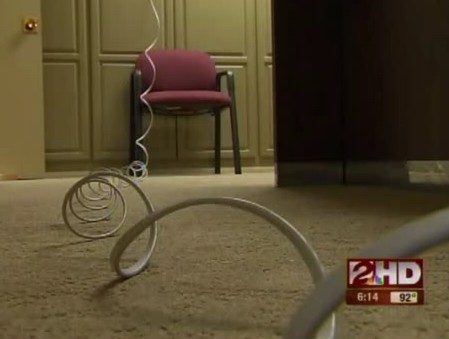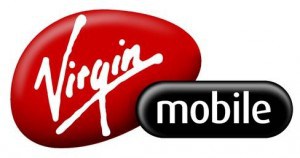 The dollar-a-holler crowd that takes “charitable” contributions from Comcast is enjoying an abundance of riches thanks to your cable bill payment and their corporate agenda to get the NBC-Comcast merger approved. Everyone is coming out to celebrate the deal — from the United Way in Denver to a Texas sheriff and a group opposing grave desecration. Regular Stop the Cap! reader Bones sent word Comcast’s Money Party is just getting started.
The dollar-a-holler crowd that takes “charitable” contributions from Comcast is enjoying an abundance of riches thanks to your cable bill payment and their corporate agenda to get the NBC-Comcast merger approved. Everyone is coming out to celebrate the deal — from the United Way in Denver to a Texas sheriff and a group opposing grave desecration. Regular Stop the Cap! reader Bones sent word Comcast’s Money Party is just getting started.
The Wrap notes Comcast has donated $1.8 billion in cash and in-kind largess to non-profit organizations since 2001, many of which will helpfully throw 44 cents back in the form of supportive letters to the Federal Communications Commission telling them to do whatever America’s largest cable company wants.
It’s all a part of the dirty little game some non-profits play with corporate benefactors to work against your consumer interests. Even worse, many of these same groups will also ask -you- for a donation as well. If Comcast keeps raising its rates, perhaps the best option in response to those playing on Comcast’s side is to tell them you already sent a donation… to Comcast.
This year’s circus of money has generated a torrent of correspondence to the FCC that is often nothing less than absurd.
The Wrap found one letter from the president of the Washington, D.C.-based Cherry Blossom Festival. Did you know cherry blossoms were deeply committed to seeing Comcast and NBC get married?
“Over the past few years, Comcast has generously donated services and sponsorship to our events,” Diana Mayhew, president of the Washington, D.C.-based Cherry Blossom Festival, wrote to the Federal Communications Commission in July. “I believe as Comcast teams up with NBC, it will continue to be a great partner for the Cherry Blossom Festival.”
But it gets much sillier.
Stop the Cap! has compiled just a sampler of comments from several interest groups all in a hurry to get their letters into the public record. Most were bad, but we also include an example of a letter from a group that didn’t simply applaud the deal. Our comments are in italics:
 National Puerto Rican Coalition: “In our view, […] this joint venture will lead to valuable benefits and unprecedented advances in media diversity for Hispanics and other people of color.”
National Puerto Rican Coalition: “In our view, […] this joint venture will lead to valuable benefits and unprecedented advances in media diversity for Hispanics and other people of color.”
Do you think the fact NPRC also received valuable funding from the Comcast Foundation might have had something to do with their cheerleading letter?
Cuban American National Council
Hispanic Federation
League of United Latin American Citizens
National Council of La Raza
National Hispanic Media Coalition
SER-Jobs For Progress National, Inc.: “We strongly believe that the Memorandum of Understanding between Comcast and NBCU and the Hispanic Leadership organizations seeks to promote the goals of expanding economic opportunity for Hispanic families and preserving and enhancing programming for Hispanic audiences, and view these commitments as stepping stones to a more responsive and responsible corporate citizenry.”
These groups, many of which also receive direct funding from Comcast, went over the top cooking up a “Memorandum of Understanding” (or is it a shakedown agreement) to land positions on Comcast’s “Advisory Councils.” These Latino groups managed to get their travel and other expenses paid for by Comcast to attend twice-yearly meetings to discuss diversity issues. Their agreement also allows this coalition to empower itself, by getting Comcast to agree to call them when looking for “qualified” Latino law firms, suppliers and vendors, and even top management. That provides these groups power and influence as interested candidates appeal to them to gain a spot on the “qualified” list. But it goes even further — Comcast has to add several “qualified” (identified with the help of these groups) Latino-owned cable channels to the lineup whether subscribers want them or not.
This agreement was marked “confidential,” but you can read a copy right here. By the way, it’s no surprise the League of United Latin American Citizens is on this list. They’ll peddle themselves out to any Big Telecom company that comes with a check in hand, especially AT&T.
Gay & Lesbian Alliance Against Defamation (“GLAAD”): “Given the weight and significance of the Comcast/NBCU merger, GLAAD urges the FCC to ensure that the community of lesbian, gay, bisexual and transgender Americans are not forgotten in its calculus of diversity, and that the stories and visibility of LGBT people and their families are held up as part of the valued diversity in its discussions, analysis and recommendations in this merger.
GLAAD’s filing was an example of a respectable comment letter filed by a minority interest group. They didn’t take a strong position for or against the merger. Instead, they shined a light on the issues that concern the LGBT community and said the FCC should take a closer look. That’s fair and appropriate.
Hmong New Life Radio Broadcasting
Hmong Women’s Heritage Association
Hmong Report At 7
Lao Family Community of Fresno
Sacramento Asian-American Minority, Inc.
National Hmong Grave Desecration Committee: “We believe Comcast’s sensitivity to our need for such programming speaks extremely well of them as a company. It is a clear indication that they will continue to exhibit their sense of the responsibility to underserved communities such as ours subsequent to a merger with NBC-Universal.”
These six groups must be new to the influence game because they each sent nearly identical (often word for word) letters to the FCC in support of the merger. On the ludicrous scale, nothing beats the National Hmong Grave Desecration Committee finding itself compelled to write a formal letter to the FCC on a multi-billion dollar cable-broadcast merger.

Here's something to remember us by....
Mile High United Way: “Comcast has provided sizeable foundation grants for DRH projects and other meaningful financial donations to other United Way programs. In addition to philanthropy and volunteerism, the company has also provided us with top notch communications support. The company has helped us create video presentations for our key fundraising efforts; it has placed public service announcements on its cable stations in an attempt generate attention and attendance for our events; it has also provided time on its Comcast Newsmakers public service broadcast to publicize our events, our programs and our people.”
That’s all wonderful, but none of it justifies or even argues for a merger between a cable and television network. This is nothing more than dollar-a-holler advocacy at work — United Way gets goodies from Comcast and now they are returning the favor. What United Way won’t get from our family is another nickle. After all, our contributions to United Way pay for this group’s time and effort peddling Comcast’s corporate agenda to the FCC. And I thought the United Way was supposed to be a charitable organization, not a lobbyist advocating for Comcast.
Sheriff Adrian Garcia – Harris County (Tex.): “Comcast is not just a business operating in Harris County, it is a partner in our effort to be a better and safer community. I hope the FCC will keep all that Comcast does in mind and permit the NBC Universal partnership to move forward.”
Voters in Harris County might want to keep this letter in mind come election time. This shockingly inappropriate involvement by a law enforcement agency willing to stick its nose in a corporate merger is inexcusable. Perhaps Harris County needs a sheriff that will spend time fighting crime, not typing up letters to benefit the cable company. Oh, and by the way Sheriff — Comcast really is just a business.
The National Zoo: “In sum, Comcast has proven to be a reliable partner that cares about our work here at the Zoo in promoting innovative science, educating children, and ultimately establishing a beautiful urban park offering families excitement as well as a welcome place to enjoy nature. We deeply care about our engagement with our local friends and families here in Washington, D.C. and appreciate the fact that Comcast shares our commitment to serving the local community.”
That’s grand, but has nothing to do with a corporate merger proposal. Comcast’s subscribers are the ones who ultimately care about the Zoo. It’s their money that paves the way for all those good works.
Center for the Homeless: “I hope you will consider this testimony in favor of Comcast and its strong sense of involvement in American communities and service to those who need it most. Comcast is a true partner in the important work that we do.”
Another group whose mission should be helping the homeless is devoting time and resources to sending love notes to the FCC on behalf of a giant cable company. By the way, none of the clients your group serves can afford Comcast’s prices.
Partnership for a Drug Free New Jersey: “I look forward to our continued partnership with Comcast and am excited to welcome NBC onto their team. We will continue to reach teens all over New Jersey to help ensure that they remain drug-free and continue to bring the message of hope to so many of our state’s residents.”
The excitement is even greater when you recognize Comcast and the national umbrella group Partnership for a Drug Free America can’t thank each other enough. The non-profit explained it all in a newsletter: “At the Partnership’s third annual Making A Difference gala held this winter in the Grand Ballroom of the Waldorf-Astoria Hotel, more than 850 guests gathered to honor Ralph J. Roberts, founder and chairman of the executive and finance committee for the Comcast Corporation, and his son, Brian L. Roberts, chairman & CEO of Comcast. Chairing the gala were Geraldine B. Laybourne, chairman & CEO of Oxygen Media and James B. Lee, Jr., vice chairman of JPMorgan Chase & Co. […] The evening generated over $2.1 million to support the Partnership’s programs for children, parents and families.”
The accolades should have stopped at a “thank you” card, not with the unseemly way this group returns the favor by advocating for a merger deal involving one of their benefactors.

 AT&T likes to think of broadband as a tool towards economic recovery, but too often service problems end up hurting small businesses.
AT&T likes to think of broadband as a tool towards economic recovery, but too often service problems end up hurting small businesses.

 Subscribe
Subscribe






